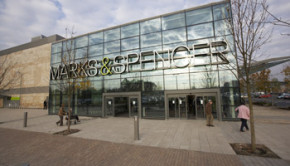Leading the team

ADM Londis’ new commercial director Peter Foley tells ShelfLife why he’s happy to be leading his team through the challenges
8 July 2009
Any ordinary office dweller entering the capacious foyer of ADM Londis’ new Johnstown headquarters would feel envious of its occupants,
with its clean finishings and ample, airy spaces, decorated with the group’s current community campaign artwork.
On the walls, the everyday characters of the Londis customer base add a splash of colour as they share their shopping lists and their daily chitchat with the world.
The purpose of the visit on this occasion was to meet the newest member of the Londis head office, commercial director Peter Foley. With over 20 years experience working on both sides of the FMCG coalface, Foley came to the group at a fortuitous stage in its development.
“There were two things that attracted me: one is that it’s owned by retailers and managed by retailers. The management team reports to the board and gets feedback from a retailer perspective, especially in terms of what they want, and that is unique in the Irish market. The other aspect is that we’re financed very well; we have no borrowings. This means we’re able to look at opportunities which is a very positive thing in our climate, the ability to consider things and to invest if something desirable arises,” he says.
As a fully qualified accountant with vast experience from both multinational FMCG corporations and wholesale companies such as Musgrave and Mangans, Foley joined Londis as commercial director in 2008, capping off the group’s positioning as one of the country’s most progressive symbol groups. “They identified a role where they needed to merge the buying function, the sales function and marketing, and put it all under one commercial role,” Foley explains. And with his career history, the challenge was hard to resist.
Did this role make sense to you, comprising three related yet separate functions?
“Without question it is logical. Previously, you would buy but there was no mechanism to make sure that you got execution. I now have a team that, when creating a promotion for customers, can identify what products we want and how best to source them. And the sales people will be involved in the selection process and it’s very important for me that that’s the case.
“I think it’s fair to say we’ve a good few examples now of where we’ve upped our game on this, and we’ve had to because of the market environment. We’ve got a lot more attractive promotions that retailers, and consumers, are increasingly buying into, which is a valuable resource for their businesses.”
Will Londis be able to continue to work with Irish suppliers or will the group have to source more internationally in order to deliver better deals to its retailers?
“It’s probably one of the top two challenges I’ve got right now. I always make the point that we have been extraordinarily loyal to our Irish suppliers. We’ve worked closely with them and we still work closely with them. But in order to compete we have to look at alternative solutions and there have been examples where, in a tactical way, we’ve increased opportunities to buy stock from the UK and indeed further away, and bring in and deliver value.”
Do you think that efficiency is the key to rebalancing the Irish supply chain?
“Absolutely. We’re now trying to reduce the cost of every case that we deliver. We have outsourced our logistics operation to ensure expertise in this area, and we constantly look at ways of making savings in terms of work processing and so on. I think it’s inevitable that the supply chain in Ireland is going to consolidate further, so that people can collectively buy and manage logistics.
“Claude-Tonna Barthet looks after our logistics and runs a very tight ship. We have an efficient operation but it’s scalable so we have the ability to reach every part of the island in about three to four hours, and we will develop this facility.
“The challenge now is that the multiples and bigger players are likely to uncouple more volume, as well as trying to deliver a new benchmark in terms of pricing to the retailer. This has clear implications for our supply strategy”
Does the downward pressure on pricing applied by large retailers represent a really big challenge for smaller retailers or are they somewhat insulated?
“Yes and no is the answer. We think that we’ve reacted well; obviously we have convenience stores and we have larger supermarket-type stores, but generally we need to compete and we need to deliver value propositions.
“We’ve been working very closely with our retailers to deliver that value on a monthly basis and we’ve been looking at the supply-side so that we can work with existing suppliers, as well as non-conventional suppliers, including grey market, which allows us to compete, and we’ll do more of that going forward.”
Do you believe the Irish consumer has changed for good?
“It is different now. I think in convenience stores the deli area remains to be redefined. It’s come to a situation where in many stores lots of retailers are offering a lot of different propositions and some have worked and some haven’t. There are different types of consumers coming in now, less builders and more women. They’re looking for more nutrition but nothing too dramatic.
“There’s opportunities there but the danger is that we have too many frills. It probably needs to be more focused and consistent. I think consistency is absolutely vital. When you go into a Londis you must have a very secure sense of what you’re going to find. I’m very clear on that and we need to sharpen what the offering is and work on that consistency.
“I do believe however the consumer will continue to want the premium offering: they want good service, they want good value.”
Do you think the Irish grocery market, the convenience channel in particular, is going to be irrevocably changed by this recession?
“I think that the Irish convenience sector is very sophisticated and there’s a major focus on the food-to-go proposition as a key component. I think that will change towards value as well as delivering convenience, and the food-to-go offering will evolve.
“I think there are competencies that convenience retailers and food markets like our own customers can continue to deliver. They can give you everyday value on a range of products but with the convenience of a location where it’s easy to do your shop three times a week.”
Would you say that Irish people have a unique relationship to community and to the ‘local shop’ compared with other European countries?
“I think so and this is important especially outside of Dublin. Here you have small towns, small villages, small communities, and you have a particular type of store serving them. The model has to comprise the type of store, the type of retailer, that can engage with the community.
“And from a marketing point of view, how do we highlight that? With our community initiatives this year we aim to increasingly demonstrate our competencies and that we’re aware of the kinds of people that come into our stores. Additionally, that in doing so we drive sales and support our retailers, and position them competitively in the market, as well as being relevant to the consumer.
“So far, our feedback from our retailers has been very positive in relation to the community campaign. So we seem to have found a degree of resonance in this area.”
As a retail partner, is your primary aim to drive sales or the long-term general development of the Londis brand?
“I think you need to do the first to do the second. Right now we have to help our retailers build and sustain sales and margin. We have to get that piece right, delivering everyday value and ensuring they feel comfortable that they can compete.
“Beyond that then we offer a lot of support. This office is called the group support office and that’s what it is, we support our retailers out there. We have a very simple, very straightforward logistics solution; only one warehouse right now. We have a very small, tight-knit customer support department so we know our customers very closely. And we have very strong IT credentials; our information systems are as good as anybody’s. So I suppose those are the building blocks on which we can say ‘we can deliver,’ and I would say punching well above our weight.”
Londis ASSIST for instance is an example of investment for the long-term?
“It is part of the overall package. We can go to potential Londis retailers and say ‘here’s what we can give you, here’s the suite of promotion packages, here’s how our IT works, here’s the logistics. We’re very efficient, here’s how we look after you.’
“Every realistic engagement is recorded in an appropriate manner so we can identify where problems occur. If a customer is having a problem with a delivery it’s reviewed at the right channel. It’s captured right away and it’s allocated properly. So we’re able to get a measure of how our customers feel about their queries or problems.
“We launched it a couple of months ago so we’re now getting good quality customer management information, and we can assess the ways in which we’re letting customers down; a late delivery, or we didn’t execute a promotional price properly, or get the posters out on time, or indeed, just telling us ‘we need more promotions like this.’ So we’re capturing this immediately.
“I think in a recession particularly investing in the right initiatives is important.”
Going forward, do you see growth for Londis or will you focus on consolidating and driving efficiencies?
“Like all players in the market we’ve experienced a downturn this year. I’d like to think we’re not as bad as some, and certain categories have grown. We think we’re more or less in line with the market so we’re re-basing the business, if you like.
“However, we are very ambitious in what we want to do in terms of recruiting new stores. It’s a tough time to try to get people to change brand but we’d like to think we can bring people interesting propositions and our goal would be to define that better so that we can recruit, whether it’s new sites or stores from other brands. It remains one of the key objectives of the business.”



 Print
Print






Fans 0
Followers